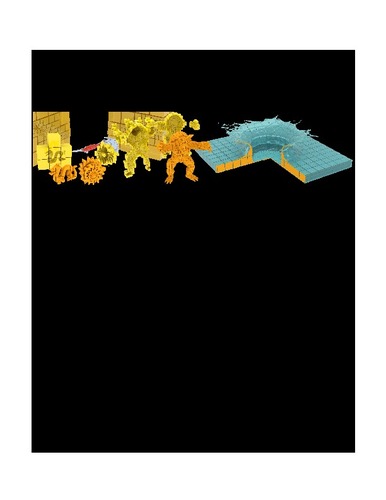| dc.contributor.author | Tao, Michael | |
| dc.contributor.author | Batty, Christopher | |
| dc.contributor.author | Fiume, Eugene | |
| dc.contributor.author | Levin, David I.W. | |
| dc.date.accessioned | 2020-02-13 19:06:43 (GMT) | |
| dc.date.available | 2020-02-13 19:06:43 (GMT) | |
| dc.date.issued | 2019-11 | |
| dc.identifier.uri | https://doi.org/10.1145/3355089.3356543 | |
| dc.identifier.uri | http://hdl.handle.net/10012/15635 | |
| dc.description.abstract | Although geometry arising "in the wild" most often comes in the form of a surface representation, a plethora of geometrical and physical applications require the construction of volumetric embeddings either of the geometry itself or the domain surrounding it. Cartesian cut-cell-based mesh generation provides an attractive solution in which volumetric elements are constructed from the intersection of the input surface geometry with a uniform or adaptive hexahedral grid. This choice, especially common in computational fluid dynamics, has the potential to efficiently generate accurate, surface-conforming cells; unfortunately, current solutions are often slow, fragile, or cannot handle many common topological situations. We therefore propose a novel, robust cut-cell construction technique for triangle surface meshes that explicitly computes the precise geometry of the intersection cells, even on meshes that are open or non-manifold. Its fundamental geometric primitive is the intersection of an arbitrary segment with an axis-aligned plane. Beginning from the set of intersection points between triangle mesh edges and grid planes, our bottom-up approach robustly determines cut-edges, cut-faces, and finally cut-cells, in a manner designed to guarantee topological correctness. We demonstrate its effectiveness and speed on a wide range of input meshes and grid resolutions, and make the code available as open source. | en |
| dc.description.sponsorship | This work is graciously supported by NSERC Discovery Grants (RGPIN-04360-2014 & RGPIN-2017-05524), NSERC Accelerator Grant (RGPAS-2017-507909), Connaught Fund (503114), and the Canada Research Chairs Program. | en |
| dc.language.iso | en | en |
| dc.publisher | ACM | en |
| dc.subject | cut-cells | en |
| dc.subject | volumetric meshing | en |
| dc.title | Mandoline: robust cut-cell generation for arbitrary triangle meshes | en |
| dc.type | Article | en |
| dcterms.bibliographicCitation | Michael Tao, Christopher Batty, Eugene Fiume, and David I.W. Levin. 2019. Mandoline: Robust Cut-Cell Generation for Arbitrary Triangle Meshes. ACM Trans. Graph. 38, 6, Article 179 (November 2019), 17 pages. https://doi.org/10.1145/3355089.3356543 | en |
| uws.contributor.affiliation1 | Faculty of Mathematics | en |
| uws.contributor.affiliation2 | David R. Cheriton School of Computer Science | en |
| uws.typeOfResource | Text | en |
| uws.peerReviewStatus | Reviewed | en |
| uws.scholarLevel | Faculty | en |

